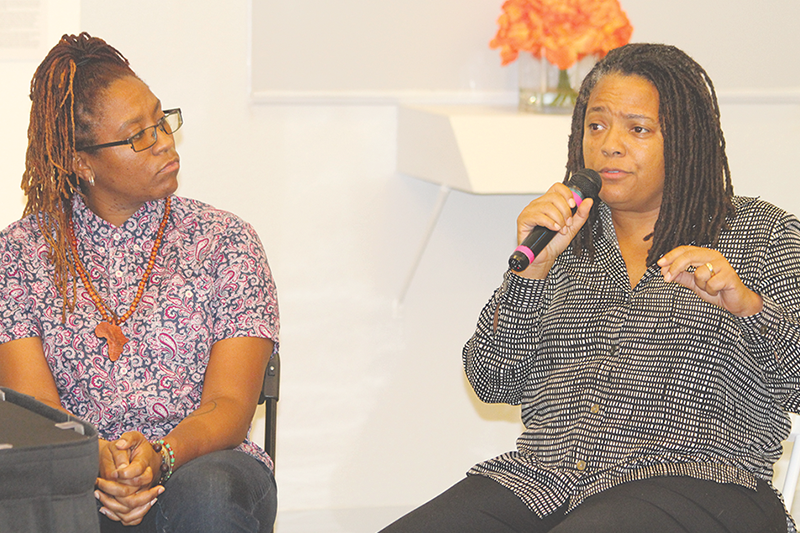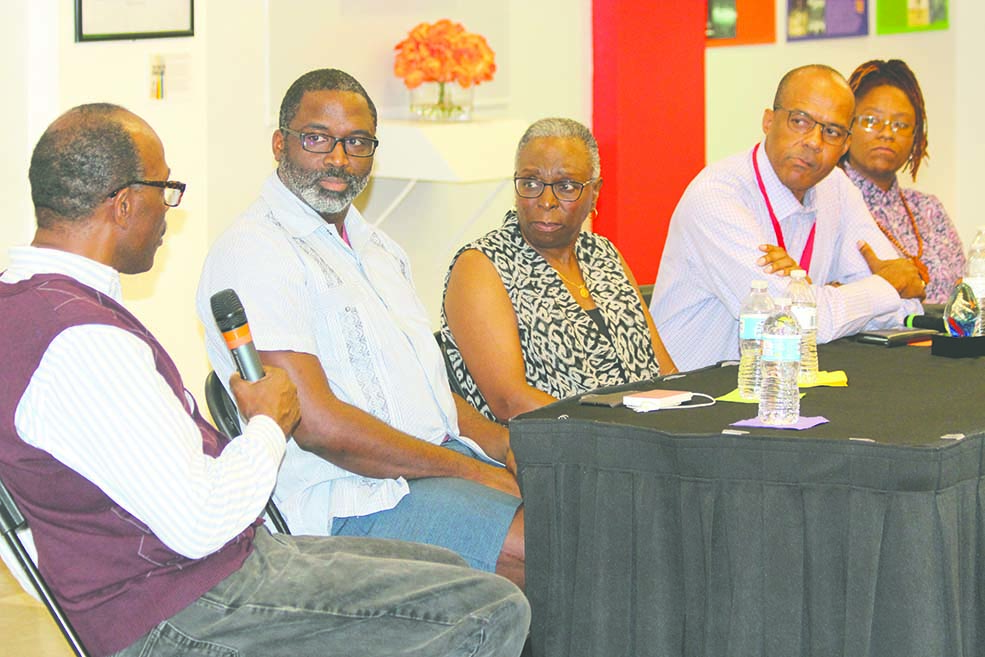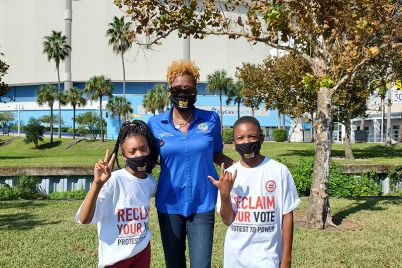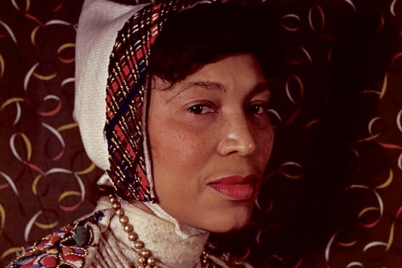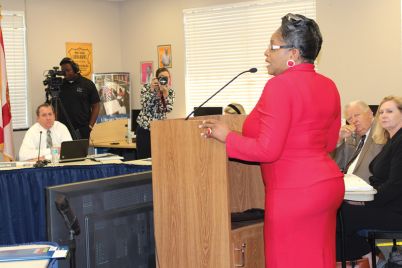BY FRANK DROUZAS, Staff Writer
ST. PETERSBURG – “I’m so ecstatic to see all of my white friends here, but I was truly hopeful for more African Americans in this audience,” said Terri Lipsey Scott at a panel discussion on June 20.
Held at the Carter G. Woodson African American History Museum, five members of the LGBTQ community shared their stories about being black and gay.
“The reality is that you cannot tell black history without telling the history of LGBT black people,” said moderator Nadine Smith, activist and CEO of Equality Florida. “And for too long in popular culture, in the visuals that we saw and the voices that we hear, gay equals white, straight equals black and often our voices and our history got lost in the gap between that.”
The members of the panel included actor/ playwright Bob Devin Jones, Bay News 9 reporter Trevor Pettiford, author Sheree Greer, founder of the Side Door Jazz series Desmond Clark and Executive Director/Co-Founder of Your Real Stories, Inc. Dr. Lillian Dunlap.
During this open discussion, they addressed the question directly about what it was to grow up being both black and gay.
Jones recalled his elementary school teacher coming to his family’s home—a one-bedroom apartment shared by eight family members—to talk to his father about young Jones, who was seven or eight at the time.
“He came into the bedroom and was telling my dad—I don’t think he used the word ‘gay’—but that I was a ‘different’ kind of child,’” Jones said, adding that after the teacher left, he and his dad never talked about it.
Many years later, Jones’ father proudly showed his friends back in California photos from his son’s union ceremony.
Clark said he didn’t come out to his parents while he was living at home, but believes his parents always knew.
One person who always knew was his grandmother, he said. On the phone with her one day, he tried explaining to her why he couldn’t attend a family reunion in Columbus, Ga. His grandmother ended the phone conversation saying, “Why are you hiding it from anyone else? You can’t hide it from God.”
That was all the “blessing” Clark needed to hear, he said, to feel that it was OK to be gay. In the Air Force at the time and stationed in Korea, Clark recalled that there were some dormitories where the beds had been pushed together, as there were gays in the military. Even though the government hesitated to fully recognize this, it made Clark feel better and not think that he was alone.
Upon his return to the States, he was stationed at MacDill Air Force Base and said he came out to some of the people there but admitted “it was scary.”
Dunlap grew up in Gary, Ind., and recalled there was a lot of “hush-toned talking” when it came to identifying people as gay. At the age of seven, Dunlap said she realized she was probably not like the others but was clueless about her sexuality.
“My elder sister Pauline was the one who told me that I was gay,” Dunlap said.
Pettiford said “gay didn’t even come to mind” until his senior year at college. In the late 1980s, he got his first job in television in his hometown where his mother was an elected official. He admitted he was “so afraid” of being exposed as a gay man he would even go out of town to go to a gay bar.
It wasn’t until he left Dayton, Ohio, and took a job at WFTV in Orlando that Pettiford had his coming out, he said. He soon discovered that he wasn’t the only on-air gay male at the station.
“All of a sudden I wasn’t alone,” Pettiford said, adding that this experience made him decide it was time to come out to his parents, and that’s exactly what he did. Once he knew his parents were behind him, he said, everyone else had to “fall in line.”
He said he looks at himself as a journalist who happens to be black and who happens to be gay.
“It’s a part of me, it’s not the whole sum of me,” he said.
Greer said she grew up in Milwaukee thinking she was “just weird,” an “introvert” and even “anti-social.”
“You know how you say someone’s extremely homophobic because they’re secretly gay? I was one of those,” she said, speaking of her high school years. “I was rude and mean and did anything that I could to sort of separate me from them, right? All the while having a crush on one of them.”
Greer said she didn’t come out until she moved away from her hometown and her family. At graduate school in Chicago, she said she finally felt “exhausted” from lying and trying “to figure things out.” One Friday night a coworker told Greer about a party that night.
“‘You’re coming, right? You’re gay, right?’” Greer recalled her coworker asking, “and I was like, ‘Yep!’ I didn’t hesitate, I didn’t think about it. I was like, ‘You got me!’ So I went out and I remember that being the most fun and the most relaxed and open that I’ve ever been.”
Then came the hierarchy of whom to tell, Greer said. She then told her older sister, then her younger sister, and when she finally had the conversation with her mother, her mother said she’d always thought so, but was hurt that Greer hadn’t opened up to her sooner.
People weren’t always as accepting of the LGBTQ community and its members as they are today, and Jones, who grew up in the 1950s and 1960s, said that back then the word wasn’t “gay” but “sissy” or “punk.”
As he didn’t play sports as a youngster, Jones said that cast an “immediate suspicion” on him. What changed his life was discovering African-American author James Baldwin while attending drama school at the Royal Academy in London.
He “found his voice” through the writer and especially identified with his 1956 novel “Giovanni’s Room,” with its homosexual themes. He was amazed at how someone could write a book about a gay romance, and the first play Jones wrote was about James Baldwin.
Pettiford, who was in a fraternity in college and played sports, said he went through an “evolution” where he immersed himself in the gay lifestyle and community and lessened his involvement with some aspects of his life before he came out, then finally learned to balance them.
“I’ve come to that point now where it’s all together,” he said. “I feel like a whole person now.”
Dunlap said there definitely was an evolution for her. It wasn’t until she moved to Florida in 1999 that she felt she could finally breathe. As a professor in Indiana and then in Missouri, Dunlap said she couldn’t really be “out” because she was black and female.
“Now do I really want to add another one? So I could actually get the door really slammed in my face?” she said.
Clark said he looks at himself as a black man who happens to be gay, and never felt the need to explain his sexuality to coworkers or others upon meeting them.
“I didn’t need to walk into the room and when they ask me what my name was say, ‘I’m Desmond Clark and I’m gay,’” he said, adding that though he never felt he needed to announce it, he never felt compelled to hide it either.
Addressing the difference between “secret” and “private,” Greer noted that “secret” implies someone is hiding something, while “private” merely refers to a part of someone’s life that he or she can share if so compelled.
“All of us need to make sure we lay claim to what is private,” she said, “because the lines are blurring more and more.”
Being both black and gay

